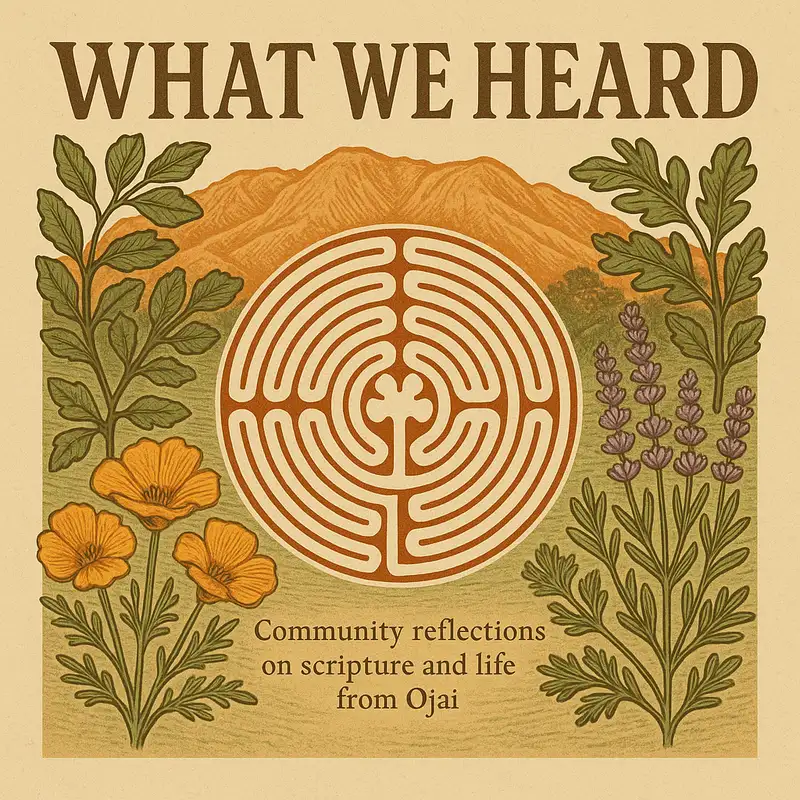 Episode 4
Episode 4
· 09:38
Sermon Proper 16C-2: Standing Tall on the Sabbath
In today’s Gospel, a woman in the synagogue
has been crippled and bent over for eighteen years.
She comes not expecting a miracle
but because this is where the prayers are said and the Word is read.
Her faith is simply showing up, again and again.
Think of that perseverance.
Eighteen years of showing up bent over,
eighteen years of seeing only the ground at her feet.
She doesn’t demand attention, doesn’t chase after Jesus.
She just keeps coming.
And on this day, her showing up puts her in the path of mercy.
How many of us know that kind of quiet faith —
the kind that keeps walking into the sanctuary
even when our hope feels thin?
How many miracles begin not with spectacular courage,
but with simply showing up?
Jesus sees her. He calls her forward.
He lays his hands on her and says, “You are set free.”
She stands up straight and praises God.
Most of us don’t need much imagination
to know what “bent over” feels like.
We carry responsibilities that never let up,
worries that tighten the chest,
griefs that weigh us down.
Our bodies remember burdens.
And we also know what it feels like to be noticed,
called by name, touched with kindness.
Those two realities — the weight and the kindness — meet here.
Luke is careful to tell us this happens on the sabbath.
That is not a scheduling detail; it is the meaning.
Too often sabbath had been treated as a fence,
keeping people from doing or receiving too much.
But Jesus reveals it as a gate —
the day made to step into healing, freedom, and restoration.
A fence shuts people in or keeps them out; a gate can swing wide.
A fence says, “Stay put.” A gate says, “Come through.”
A fence protects order; a gate creates passage.
Sabbath is God’s refusal to let slavery be the last word,
God’s reordering of time so people are not reduced to production.
When Jesus heals on the sabbath, he is not breaking the commandment;
he is fulfilling it — pushing open the gate
the commandment was always meant to be.
Isaiah says it plainly:
“If you remove the yoke… if you offer your food to the hungry…
then your light shall rise in the darkness” (Isa 58:9–10).
Sabbath is liberation you can feel in your bones:
not just rest from labor, but rest from being treated as less than human.
When Jesus says to the woman, “You are set free,”
he speaks Isaiah’s promise into her spine.
Imagine sabbath not as a fence that blocks,
but as a gate that opens —
into light at noonday, into room to breathe, into a posture that can praise.
Psalm 103 describes the One who opens that gate:
“The Lord is full of compassion and mercy,
slow to anger and of great kindness” (Ps 103:8).
Compassion sees. Mercy calls. Kindness lays hands.
The woman’s body is not a problem to solve
but a person to be restored, a life rejoined to the community’s praise.
The synagogue leader objects: “There are six days to do work.”
His protest forces the question:
is faith meant to keep things orderly, or to set people free?
Jesus answers with ordinary compassion —
“Doesn’t each of you untie your ox on the sabbath?” —
and then does the same for this daughter of Abraham.
The sabbath is for loosening knots.
Hebrews gives us another lens:
a woman standing tall in one small synagogue
belongs to an unshakable order of freedom.
God’s fire is not destruction but love that burns away the yoke
and leaves the truth standing: beloved, upright, free.
So what does it mean for us to live this story?
We practice the seeing of Jesus:
refusing to look away from those bent low —
in our pews, in our neighborhoods, in our headlines.
We practice the calling of Jesus:
words and presence that say,
“You are not your illness, your debt, your failure —
you are God’s beloved.”
We practice the touch of Jesus:
connection where healing can flow —
presence that costs us time, attention, maybe even comfort.
And we practice the praise of the healed woman:
praise that tells the truth that freedom has broken in.
Church, we belong to a kingdom that cannot be shaken.
That does not mean our world won’t tremble;
it means God’s mercy is sturdier than all that quakes.
It means that sabbath is not nostalgia for a quiet day off —
it is training in God’s new creation.
So hear the invitation:
imagine where you are bent,
and let Jesus’ words be spoken over you — “You are set free.”
Stand tall inside that word.
And then take it into the streets and workplaces and systems
where people are still bowed down.
Remove a yoke. Loosen a knot. Share bread.
Defy the lie that people are worth only what they produce.
Because sabbath is not just for rest; it is for resistance —
resistance to despair, to exploitation, to every lie that bends us low.
The gift of sabbath is this: you are more than what you produce,
and you are set free to stand tall in God’s mercy.
Sabbath is God’s weekly revolution —
rest that restores, praise that resists, freedom that will not be shaken.
And when Jesus says, “You are set free,” that word is for you —
and for the world through you.
So when you see someone stand free and tall and begin to praise,
don’t just applaud politely.
Stand with them. Add your voice. Join the song.
Because this is what sabbath is for: the world set free,
one upright body at a time.
Amen.
Listen to What We Heard using one of many popular podcasting apps or directories.